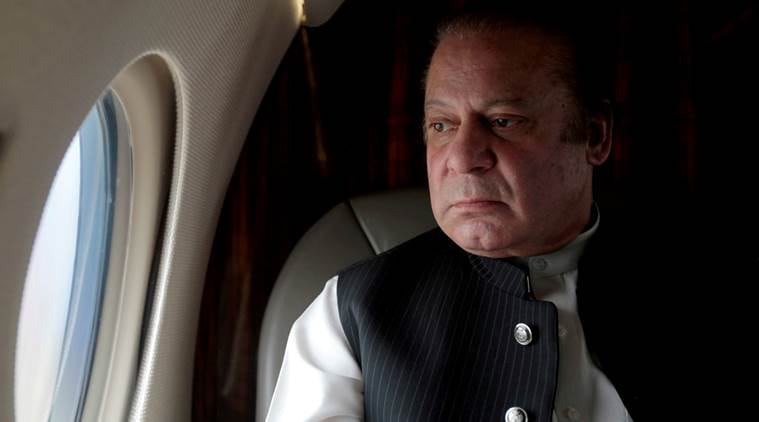Blasphemy Bites Back
Nawaz Sharif had the opportunity to scrap the law that has landed him in prison.

The former PM was ousted from power by the Supreme Court because he was not “sadiq” (truthful) and “ameen” (trustworthy) like the Holy Prophet PBUH. (Reuters)
Many laws promulgated by Pakistan to consolidate its identity as an Islamic state as per its foundational document — The Objectives Resolution — have recoiled on its politicians, including their great votary Nawaz Sharif. The former PM was ousted from power by the Supreme Court because he was not “sadiq” (truthful) and “ameen” (trustworthy) like the Holy Prophet PBUH. His interior minister is the other victim of the anti-blasphemy law, which punishes with death anyone who insults the Holy Prophet PBUH. And on the eve of election 2018, a new party, Labbaik, defending the Holy Prophet has emerged as a challenge to the state struggling to live in modern times.
Nawaz Sharif had the choice of deleting the sadiq-ameen law when other political parties were in favour of “rationalising” laws with the 18th Amendment but thought its retention was a useful “moral guide”.
Interior Minister Ahsan Iqbal, who narrowly escaped death at the hands of a “blasphemy killer” in May 2018, came from a family that actually forced Pakistan to set the death sentence as minimum penalty for an insult to the Holy Prophet. His mother Apa Nisar Fatima — daughter of a famous Ahrar Party member devoted to the cause of punishing blasphemers — was actually responsible for the promulgation of the current anti-blasphemy law.
Nisar Fatima was the Jamaat-e-Islami member of parliament in 1986 when she took up the blasphemy cause. Chief reporter Ansar Abbasi wrote in Jang (January 12, 2011) that he and a number of conservative lawyers in Lahore got together to file a petition in 1984 at the Federal Shariat Court asking for a law against insult to the Holy Prophet. In July 1984, Asma Jahangir, whose husband was an industrialist, had “insulted” the Holy Prophet in Islamabad during a speech.
Nisar Fatima raised the issue in parliament and presented the infamous bill about Section 295-C of the penal code. Law Minister Iqbal Ahmad Khan changed the text at the last minute to assign “death or life” as punishment for blasphemy. On this, Nisar Fatima took the matter back to the Federal Shariat Court saying the punishment for blasphemy was “hadd” (mentioned in the Quran) and could not be less than death.
The hearing started on April 1, 1987. Advocate generals from the provinces agreed with the petition and the judges agreed to have death as the only punishment. The court gave the government time till 1991 to amend Section 295-C. PM Nawaz Sharif wanted to challenge the verdict but desisted after a message was sent to him about how the people would react.
On May 6, Ahsan Iqbal was attending a Christian gathering in his constituency in Narowal in Punjab when a zealot of Tehreek-e-Labbaik Pakistan movement fired at him, breaking the bone of his right elbow and embedding a bullet in his lower abdomen. Pakistan’s anti-blasphemy craze delivered a high-profile victim. Earlier a federal minister had resigned in the face of clerical rage and one provincial minister of the Pakistan Muslim League-Nawaz (PML-N) walks in fear of being killed. Labbaik signalled its intent by first throwing shoes at Nawaz Sharif. The violence of language has led to physical violence.
The PML-N has its roots in the kind of deep religiosity that is now snapping at its heels. Khadim Hussain Rizvi, the unhinged leader of the campaign against the party on charges of blasphemy, enjoys the kind of street power that Pakistan has learned to tolerate ever since it allowed non-state actors to dominate its policymaking. The party nearly splintered last year as many politicians patronised by the custodians of shrines in the countryside announced their resignations from the party. The attempt on the life of Ahsan Iqbal queers the field for the PML-N in the coming election and foreshadows its likely defeat at the hands of voters who may be swayed by the anti-blasphemy craze in the country.
The writer is consulting editor, Newsweek Pakistan
For all the latest Opinion News, download Indian Express App
More From Khaled Ahmed
- A Poll Outcome ForetoldWhen a Pakistan PM falls foul of the deep state, the Opposition, senior bureaucrats and the judiciary get together against him...
- The Pakistan ParadoxPakistan’s persona non grata, ex-ambassador to the US, Husain Haqqani, in his book Reimagining Pakistan: Transforming a dysfunctional state, lists the reasons why Pakistan today…
- Revisiting BenazirA new biography looks back at the time when charisma reigned, as did corruption..








































No hay comentarios:
Publicar un comentario